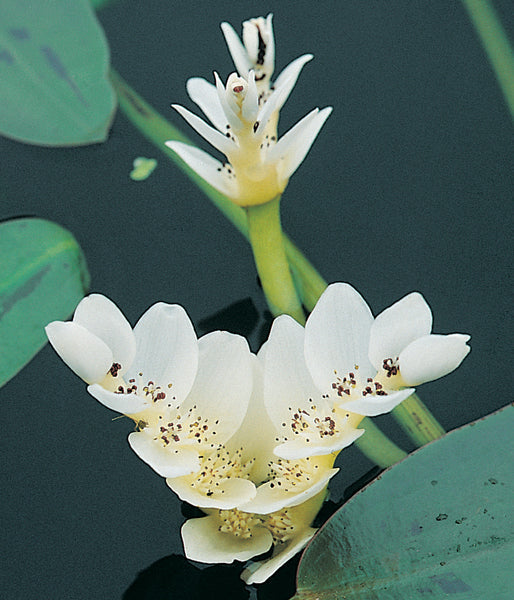Hadeco
Waterblommetjies - 5 bulbs p-pack (59)
Waterblommetjies - 5 bulbs p-pack (59)
SKU:0201010190P
Log in to purchase
Waterblommetjie is a delightful edible tuberous rhizome. Enjoy waterblommetjie in homemade recipes from winter through to spring.
Waterblommetjie (Aponogeton)
How to plant, care for and grow waterblommetjie
Fun fact: buds and flowers are edible and used in waterblommetjiebredie.
The waterblommetjie is a tuberous rhizome and there are 45 to 50 species in Africa and Asia. The plants are used as a pond decoration and usually flower from winter into early summer but depending on the location, they could flower sporadically through the year. At maturity it will reach 10– 60cm tall.
Seasons and planting
The waterblommetjie can be planted in clean water at a depth of 10-60cm. It prefers muddy ponds and the rhizome can be thrown into the pond during autumn. The rhizome should sink but if it does not, it can be attached to a small stone to help it. A spacing of about 1m is suggested. They are also pot friendly and should be planted shallowly in the pot with composted soil. The lowest temperature that the plant can tolerate is 0°C.
In order to protect the plant from kois, a plastic mesh can be created that closes around the bottom of the pot and stretches to the surface of the pond. The nutrient cycle of the fish in the pond will provide the plant with the nutrients it needs.
Propagation
The rhizomes are pollinated by bees and multiply freely. The seeds will germinate on the surface of the water and these can be used for replanting.
Waterblommetjie (Aponogeton)
How to plant, care for and grow waterblommetjie
| Family | Aponogetonaceae |
| Common name | Waterblommetjie, water hawthorn, cape pond weed, vleikos |
| Sun Exposure | Full sun and semi-shade. |
| Flower Colours | White |
| Predators | Kois disturb soil and eat leaves |
Fun fact: buds and flowers are edible and used in waterblommetjiebredie.
The waterblommetjie is a tuberous rhizome and there are 45 to 50 species in Africa and Asia. The plants are used as a pond decoration and usually flower from winter into early summer but depending on the location, they could flower sporadically through the year. At maturity it will reach 10– 60cm tall.
Seasons and planting
| Jan | Feb | March | April | May | June | July | Aug | Sept | Oct | Nov | Dec | ||
| Available | NO | ||||||||||||
| Plant | NO | ||||||||||||
| Flowering | NO | ||||||||||||
The waterblommetjie can be planted in clean water at a depth of 10-60cm. It prefers muddy ponds and the rhizome can be thrown into the pond during autumn. The rhizome should sink but if it does not, it can be attached to a small stone to help it. A spacing of about 1m is suggested. They are also pot friendly and should be planted shallowly in the pot with composted soil. The lowest temperature that the plant can tolerate is 0°C.
In order to protect the plant from kois, a plastic mesh can be created that closes around the bottom of the pot and stretches to the surface of the pond. The nutrient cycle of the fish in the pond will provide the plant with the nutrients it needs.
Propagation
The rhizomes are pollinated by bees and multiply freely. The seeds will germinate on the surface of the water and these can be used for replanting.


